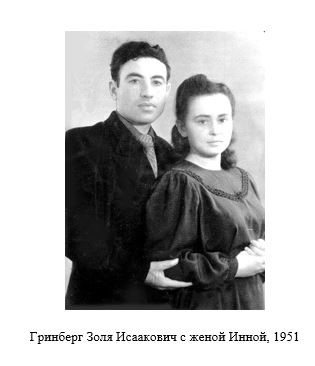Zolia Grinberg was born as Zelik Grinberg in 1923 in the town of Savran, halfway between Odessa and Kirovograd (now Kropyvnytskyi, in central Ukraine). However, Soviet official documents recorded as his first name his family nickname Zolia. In June 1941, 17-year old Grinberg graduated from a construction college in Kirovograd and the very next day the Soviet-German war began. Zolia volunteered for military service but, because of his age, he was sent instead for military training.
After completing a course in anti-tank artillery, from April 1942 Lieutenant Grinberg fought on the Leningrad Front in the defense of Leningrad (now St. Petersburg). His first military award was the For the Defense of Leningrad medal. In September 1943, after the breaking of the blockade of Leningrad, Zolia was transferred to the 1st Baltic Front as the commander of a reconnaissance platoon at a rifle division. He was wounded at least twice. After one of his injuries, in the hospital, he learned that his family had been evacuated to Soviet Central Asia. He sent his parents and sisters a telegram consisting of only three words: "Alive, your Zolia". His mother was hopelessly ill and, as his relatives recalled, this telegram helped prolong her life.
Grinberg's last injury, in 1944, was serious and he was dismissed from military service toward the end of that year. When Zolia entered his home in Kirovograd, his father Isaak did not recognize him. In 1941, Isaak had said good-bye to a youth but in 1944 he saw before him a mature man. Grinberg returned home with two military orders – that of The Red Star and that of The Patriotic War, 2nd Class.
After the end of the war, in the summer of 1945, in the context of the rampant criminality in the Soviet Union, Grinberg narrowly escaped with his life. Some criminals attempted to seize his pistol and only the aid of a friend saved his life.
In the following year, Grinberg lived through a personal drama. He met a non-Jewish girl named Irina, who was charming and beautiful. Their affection was mutual. Several people who knew about their love went to Grinberg and told him that she was a niece of Zhuravlev. The latter was a notorious member of the Ukrainian collaborationist police in Kirovograd during the war who sent to Nazi concentration camps or personally killed hundreds of Jews and members of the resistance in the town. (Zhuravlev was located by the Soviets and put on trial in the late 1950s). Learning that was a heavy blow for Grinberg and he severed his relationship with Irina.
Zolia Grinberg died in the early 2000s.







